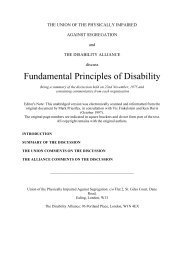Global-Report-Living-Colour-dr2-2
Global-Report-Living-Colour-dr2-2
Global-Report-Living-Colour-dr2-2
You also want an ePaper? Increase the reach of your titles
YUMPU automatically turns print PDFs into web optimized ePapers that Google loves.
80<br />
Inclusive Communities = Stronger Communities<br />
GLOBAL REPORT ON ARTICLE 19: THE RIGHT TO LIVE AND BE INCLUDED IN THE COMMUNITY<br />
UNITED STATES Shareen is the<br />
mother of a beautiful son, Stefon,<br />
18, who has multiple disabilities,<br />
including Angelman syndrome (a<br />
genetic deficiency of the 15th<br />
chromosome), cerebral palsy, an<br />
intellectual disabilities, epilepsy,<br />
asthma, language impairment, and<br />
neuromuscular scoliosis. Stefon uses<br />
assistive devices for ambulation and<br />
requires support 100% of the time.<br />
For many years, Shareen was unable<br />
to work and unable to afford the type<br />
of services her son required. She and<br />
her son lived in distressed<br />
neighborhoods in public housing and<br />
relied on food stamps to survive.<br />
Supports to Families<br />
Our members report that families are the main source of<br />
support to people with intellectual disabilities wherever<br />
they live in the world. Families not only provide care, they<br />
support participation in the community (education,<br />
employment, recreation, building relationships and<br />
accessing services). Yet families report that they receive<br />
little or no support from governments or the community<br />
to fulfill this role.<br />
Our focus groups of self-advocates consistently recognized<br />
the support provided by parents. A Spanish participant<br />
said, “I get a lot of support from my family. I know very<br />
well that without their help to pay my rent I never would<br />
have been able to leave home for a place of my own.”<br />
Countries such as Japan and China have policies clearly<br />
stipulating that the responsibility for persons with<br />
intellectual disabilities rests with their families. Other<br />
countries may not have explicit policies, but families feel<br />
that responsibility. In a major survey done by The Arc of<br />
the United States in 2010 families reported the failure of<br />
communities to support them in their role.<br />
“While families continue to be the primary source of support<br />
and care for people with people with intellectual disabilities,<br />
the promise of community support to lighten the load is not<br />
being met. Parents, siblings and family members struggle<br />
mightily so that their family member with intellectual<br />
disabilities can continue to live at home, or independently,<br />
and have a typical life. The majority of families report that<br />
they provide personal care – such as bathing, feeding (61%),<br />
administer medications (69%), provide direct financial<br />
support (72%), maintain the home (74%), manage financial<br />
affairs (78%), arrange/monitor outside services (76%), make<br />
social arrangements (76%), cook, clean and do laundry (80%),<br />
provide transportation (84%) and emo¬tional reassurance<br />
(86%) and more.



